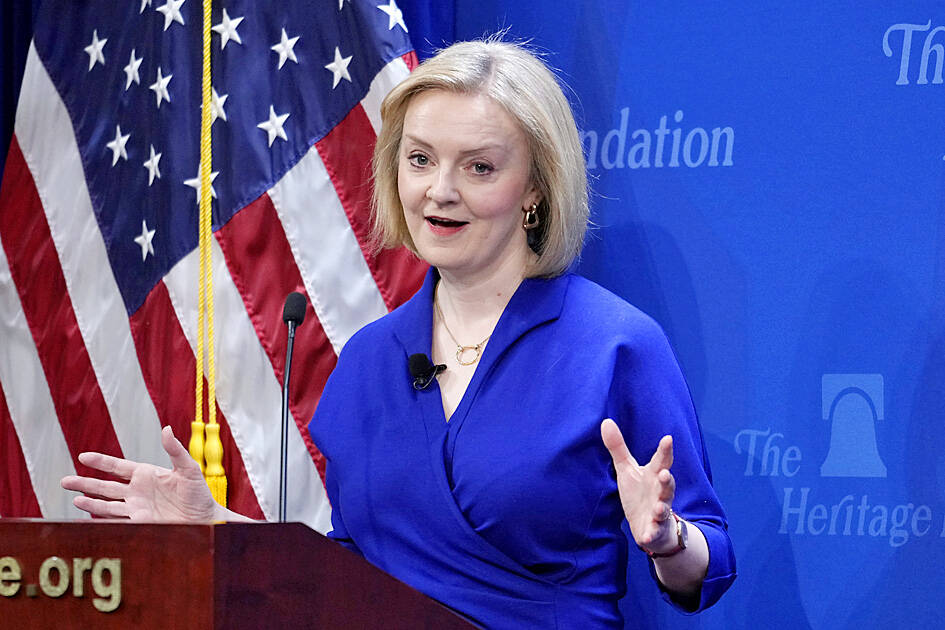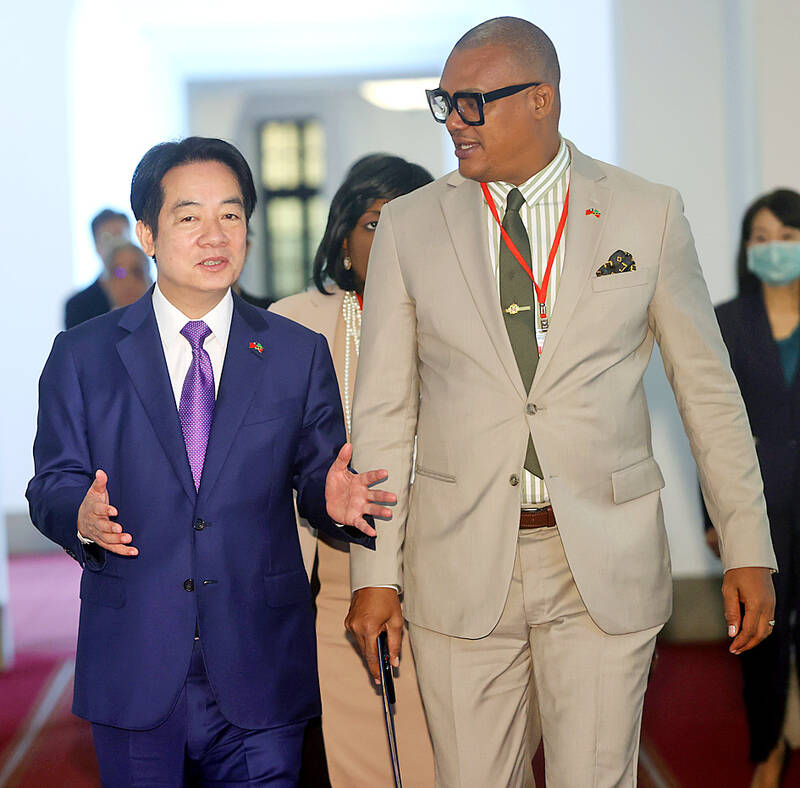Former British prime minister Liz Truss is to visit Taiwan next week from Tuesday to Saturday, the Ministry of Foreign Affairs said in a press release yesterday.
“Taiwan is a beacon of freedom and democracy. I’m looking forward to showing solidarity with the Taiwanese people in person in the face of increasingly aggressive behavior and rhetoric from the regime in Beijing,” Truss said upon announcing the visit.
The planned visit demonstrates Truss’ firm support for Taiwan and the close friendship between Taiwan and the UK, the ministry said.

Photo: AP
Truss has been a friend of Taiwan for a long time, and repeatedly underscored the importance of peace and stability across the Taiwan Strait when she was British secretary of state for foreign, commonwealth and development affairs in 2021 and last year, and continued to voice support for Taiwan afterward, it said.
The UK “must ensure that democracies like Taiwan are able to defend themselves,” she said in a speech regarding her foreign policy in April last year.
The West must learn from its mistakes in failing to deter Russia’s invasion of Ukraine and apply those lessons to Taiwan to “protect peace and stability in the Taiwan Strait,” she said at the NATO summit in Madrid in June last year.

Photo: CNA
Truss is to meet with government leaders, and people in business and academia, as well as deliver a speech on Wednesday next week at the invitation of the Prospect Foundation, the ministry said.
In other news, visiting Saint Kitts and Nevis Deputy Prime Minister Geoffrey Hanley invited Vice President William Lai (賴清德) to celebrate the 40th anniversary of the Caribbean country’s independence in September.
Hanley, who arrived on Monday leading a delegation that is to stay until Friday, met with Lai at the Presidential Office in Taipei.
This year marks the 40th anniversary of Saint Kitts and Nevis’ independence, as well as its diplomatic relations with Taiwan, Hanley said.
The partnership between the two nations is formed on the basis of democracy, peace and the rule of law, he said.
The spirit of unity gives both sides confidence to face global challenges together, including climate change and the post-COVID-19 pandemic era, he said, adding that Taiwan can make meaningful contributions to his country.
Taiwan has provided great help to Saint Kitts and Nevis in education, such as working with the country’s Ministry of Education to train young people and encourage them to undergo higher education, he said.
He invited Taiwanese students to visit Saint Kitts and Nevis to learn English, the country’s official language.
Saint Kitts and Nevis Prime Minister Terrance Drew invited President Tsai Ing-wen (蔡英文) to attend the independence anniversary when he visited Taiwan in November last year, adding that he would like to extend the same invitation to Lai.
Taiwan was the first country to form diplomatic relations with Saint Kitts and Nevis after its independence in 1983, after which the two sides have been supporting each other and maintaining a strong partnership, Lai said.
Taiwan has been working closely with the ally in a diverse range of fields with great success, including education, public health, infrastructure, information and communications, waste treatment and green energy, he said.
Lai thanked the Congress of St Kitts and Nevis for passing resolutions last month to support Taiwan’s participation in international organizations such as the WHO, the International Civil Aviation Organization and Interpol.
Hanley, who is also minister of education, is dedicated to promoting special education, and vocational education and training, Lai said.
Lai wished Hanley a fruitful trip, during which he is to visit Wenshan School of Special Education, Taipei Municipal Daan Vocational High School and the Workforce Development Agency.
The delegation also met with Minister of Foreign Affairs Joseph Wu (吳釗燮) yesterday and attended a banquet with him.
The two countries have had a profound friendship for 40 years and would continue to strengthen bilateral ties based upon the sound foundation, Hanley said.

MORE VISITORS: The Tourism Administration said that it is seeing positive prospects in its efforts to expand the tourism market in North America and Europe Taiwan has been ranked as the cheapest place in the world to travel to this year, based on a list recommended by NerdWallet. The San Francisco-based personal finance company said that Taiwan topped the list of 16 nations it chose for budget travelers because US tourists do not need visas and travelers can easily have a good meal for less than US$10. A bus ride in Taipei costs just under US$0.50, while subway rides start at US$0.60, the firm said, adding that public transportation in Taiwan is easy to navigate. The firm also called Taiwan a “food lover’s paradise,” citing inexpensive breakfast stalls

TRADE: A mandatory declaration of origin for manufactured goods bound for the US is to take effect on May 7 to block China from exploiting Taiwan’s trade channels All products manufactured in Taiwan and exported to the US must include a signed declaration of origin starting on May 7, the Bureau of Foreign Trade announced yesterday. US President Donald Trump on April 2 imposed a 32 percent tariff on imports from Taiwan, but one week later announced a 90-day pause on its implementation. However, a universal 10 percent tariff was immediately applied to most imports from around the world. On April 12, the Trump administration further exempted computers, smartphones and semiconductors from the new tariffs. In response, President William Lai’s (賴清德) administration has introduced a series of countermeasures to support affected

CROSS-STRAIT: The vast majority of Taiwanese support maintaining the ‘status quo,’ while concern is rising about Beijing’s influence operations More than eight out of 10 Taiwanese reject Beijing’s “one country, two systems” framework for cross-strait relations, according to a survey released by the Mainland Affairs Council (MAC) on Thursday. The MAC’s latest quarterly survey found that 84.4 percent of respondents opposed Beijing’s “one country, two systems” formula for handling cross-strait relations — a figure consistent with past polling. Over the past three years, opposition to the framework has remained high, ranging from a low of 83.6 percent in April 2023 to a peak of 89.6 percent in April last year. In the most recent poll, 82.5 percent also rejected China’s

PLUGGING HOLES: The amendments would bring the legislation in line with systems found in other countries such as Japan and the US, Legislator Chen Kuan-ting said Democratic Progressive Party (DPP) Legislator Chen Kuan-ting (陳冠廷) has proposed amending national security legislation amid a spate of espionage cases. Potential gaps in security vetting procedures for personnel with access to sensitive information prompted him to propose the amendments, which would introduce changes to Article 14 of the Classified National Security Information Protection Act (國家機密保護法), Chen said yesterday. The proposal, which aims to enhance interagency vetting procedures and reduce the risk of classified information leaks, would establish a comprehensive security clearance system in Taiwan, he said. The amendment would require character and loyalty checks for civil servants and intelligence personnel prior to